In an age where diet culture often promotes restriction, the concept of consuming high calorie foods for weight loss may seem counterintuitive. However, for individuals seeking to gain weight healthfully, stabilize metabolic function, or build muscle mass—especially within the context of a whole-food plant-based lifestyle—incorporating calorie-dense options can be an essential and strategic nutritional approach. Rather than focusing solely on caloric quantity, this method emphasizes food quality, nutrient density, and metabolic efficiency. For many transitioning to plant-based diets, understanding how to select the best calorie dense foods is crucial to maintaining energy balance without sacrificing health goals.
You may also like: Plant Based Diet vs Standard American Diet: What the Latest Studies Reveal About Long-Term Health Outcomes
While many equate plant-based eating with low-calorie, high-fiber meals, a deeper dive reveals a diverse range of high calorie, nutrient-rich foods that can support sustained energy levels, healthy weight gain, and muscle development. From avocados and nut butters to legumes and whole grains, these choices not only provide the caloric density necessary for weight management but also contribute essential vitamins, minerals, and phytonutrients. Importantly, the right plant-based choices can help avoid the pitfalls of processed calorie intake, ensuring that every bite supports both physiological health and ethical sustainability. In this exploration, we delve into how whole-food plant-based eating can align with goals of healthy weight gain, helping readers choose what has more calories while prioritizing overall wellness.

Understanding the Role of Food Density in Healthy Weight Gain
To understand how high calorie plant-based foods support healthful weight gain, it’s essential first to grasp the concept of food density. Food density refers to the amount of energy—or calories—contained within a given weight or volume of food. Foods that are high in calories per gram are considered calorie-dense, and they are especially valuable for individuals with elevated energy needs, such as athletes, people recovering from illness, or those with high metabolic rates. Integrating calorie-dense options allows for the intake of more energy without requiring an overwhelming volume of food, which can be particularly beneficial for those with limited appetites.
In the context of plant-based nutrition, high food density doesn’t equate to empty calories. Instead, it represents an opportunity to consume foods that are both rich in energy and packed with nutrients. For example, nuts and seeds offer concentrated sources of calories alongside healthy fats, protein, fiber, and key micronutrients like magnesium and vitamin E. By choosing these types of foods, individuals can effectively meet their energy requirements while also nourishing their bodies on a cellular level.
This approach counters the common misconception that calorie-dense foods must be unhealthy or processed. In reality, some of the best calorie dense foods come straight from nature and support multiple health goals simultaneously. Understanding food density enables informed dietary planning that balances caloric needs with nutrient intake, offering a sustainable pathway to healthy weight gain within a plant-based framework.
Best Calorie Dense Foods in a Plant-Based Diet
Selecting high-calorie plant-based foods requires more than just finding what has more calories. It’s about choosing foods that provide a rich nutritional profile in addition to caloric load. Avocados, for example, are among the best calorie dense foods due to their high monounsaturated fat content, fiber, and potassium levels. Just one medium avocado can provide over 200 calories, along with antioxidants and heart-healthy compounds that support overall wellness. Their versatility makes them an ideal addition to salads, sandwiches, smoothies, and even desserts.
Another powerful option is nut butters, particularly almond, cashew, and peanut butter. These spreads pack a high number of calories per tablespoon, with roughly 90–100 calories each, while also providing protein, unsaturated fats, and a spectrum of minerals including zinc and iron. Incorporating them into snacks like banana slices or whole-grain toast can offer an easy way to increase calorie intake without feeling overly full. Additionally, combining nut butters with oats or plant-based yogurts can further elevate caloric and nutritional content.
Whole grains such as quinoa, brown rice, and oats are also valuable in this context. While often associated with carbohydrates and fiber, these grains also provide calories, protein, and essential B vitamins. Unlike refined grains, they contribute sustained energy release and metabolic stability. Cooking grains in plant-based milk, topping them with seeds or dried fruits, or using them as a base for hearty bowls can significantly increase their caloric density without compromising health.
Dried fruits offer another potent solution, concentrating calories from whole fruits into a smaller, more energy-dense form. A small handful of dates, apricots, or raisins can deliver quick energy alongside iron, potassium, and antioxidants. When paired with nuts or included in trail mixes, they create a balanced snack rich in both calories and nutrients. This mindful combination of foods allows for flexible meal planning that supports both energy intake and nutritional diversity.
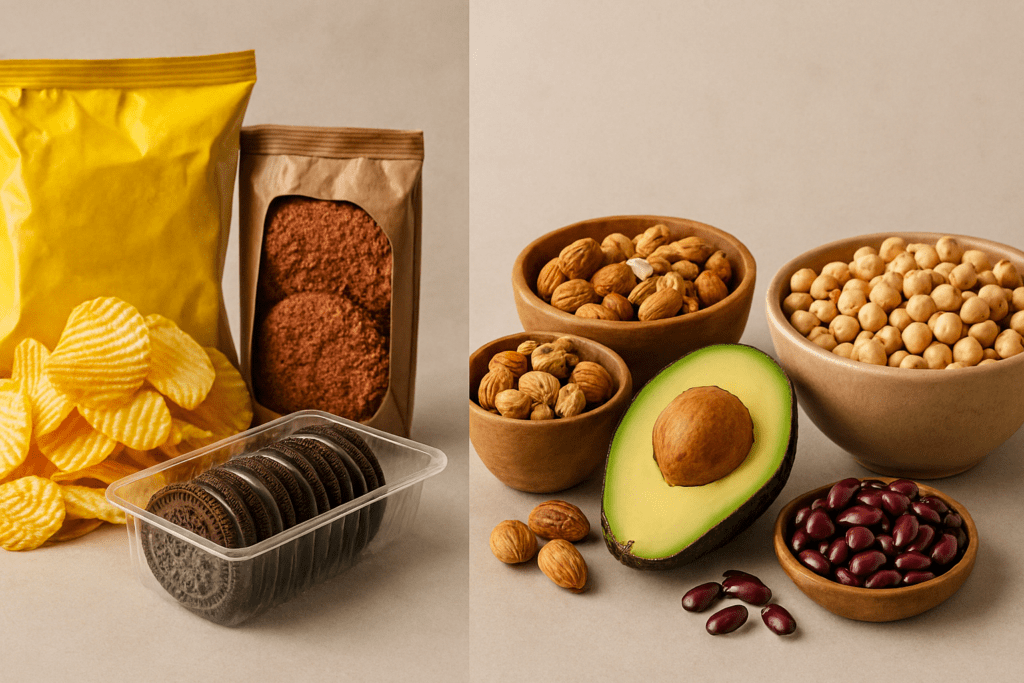
How High Calorie Foods for Weight Loss Work Within a Metabolic Framework
Though it may sound paradoxical, integrating high calorie foods for weight loss is entirely possible—and in some cases, essential—depending on individual physiology. When the body is underfed or chronically deprived of energy, it can shift into a state of metabolic conservation, slowing down key functions and preserving fat stores rather than utilizing them. This phenomenon, often referred to as adaptive thermogenesis, makes weight loss increasingly difficult over time and can lead to nutrient deficiencies, hormonal imbalances, and fatigue.
By contrast, strategically increasing energy intake through calorie-dense, plant-based foods can support metabolic health and restore the body’s natural equilibrium. This approach signals to the body that it is no longer in a state of scarcity, allowing it to burn energy more efficiently, build lean muscle mass, and release excess fat. When accompanied by regular physical activity—particularly resistance training—this shift can catalyze positive changes in body composition, promoting fat loss while supporting lean tissue growth.
It’s important to recognize that not all calories are created equal. While any food technically contributes to caloric intake, whole, plant-based calorie sources deliver far more than just energy. Their fiber, phytonutrients, and essential fats contribute to hormonal regulation, blood sugar stability, and improved satiety. These physiological benefits make calorie-dense plant foods especially effective in supporting long-term weight goals, whether they involve gain, maintenance, or even fat loss.
Many people mistakenly believe that to lose weight, they must avoid high calorie foods at all costs. However, when nutrient-rich, whole-food sources are used, the opposite may be true. Foods that provide steady energy, curb cravings, and promote metabolic function are often those with higher calorie content—especially when they come from unprocessed, plant-based sources. Understanding how calories function in the body and how food density affects metabolic health is key to achieving and maintaining a healthy weight in a sustainable manner.
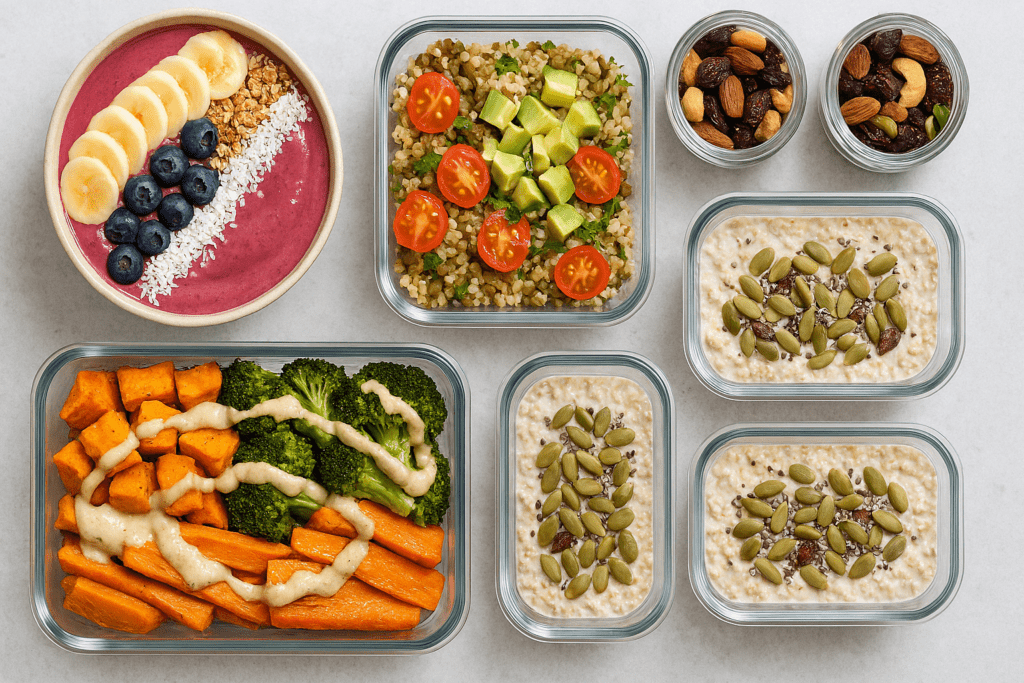
Strategic Meal Planning with Calorie Dense Plant-Based Foods
Successful integration of high calorie foods into a plant-based diet requires intentional meal planning that balances energy density with nutrient diversity. One of the most effective strategies involves layering calorie-dense foods into each meal, ensuring that even smaller portions provide substantial nourishment. For example, a smoothie made with bananas, avocado, chia seeds, plant-based protein powder, and oat milk can serve as a nutrient-packed breakfast with enough calories to fuel several hours of activity.
Lunches and dinners can be similarly optimized by including legumes such as lentils, chickpeas, and black beans alongside whole grains and healthy fats. For instance, a quinoa bowl topped with roasted vegetables, tahini dressing, and a sprinkle of hemp seeds delivers a diverse array of macronutrients while significantly boosting caloric intake. These combinations also support digestive health and microbiome diversity, further enhancing overall well-being.
Snacks play a vital role in meeting caloric goals without overwhelming the digestive system. Options such as trail mix, energy balls made from nuts and dates, or whole grain toast with hummus and olive oil can contribute hundreds of calories between meals, helping to maintain steady energy levels. Additionally, including healthy oils such as extra virgin olive oil or avocado oil in cooking can enhance both the flavor and energy density of meals without compromising their nutritional integrity.
The key is to avoid relying on processed vegan junk foods that, while calorie-rich, may lack essential nutrients and contribute to inflammation or metabolic imbalance. Instead, focus on whole-food combinations that satisfy hunger, support metabolic efficiency, and encourage sustained health. By prioritizing plant-based sources of calories food planning becomes both intuitive and deeply nourishing, helping individuals stay energized, satiated, and on track with their health goals.
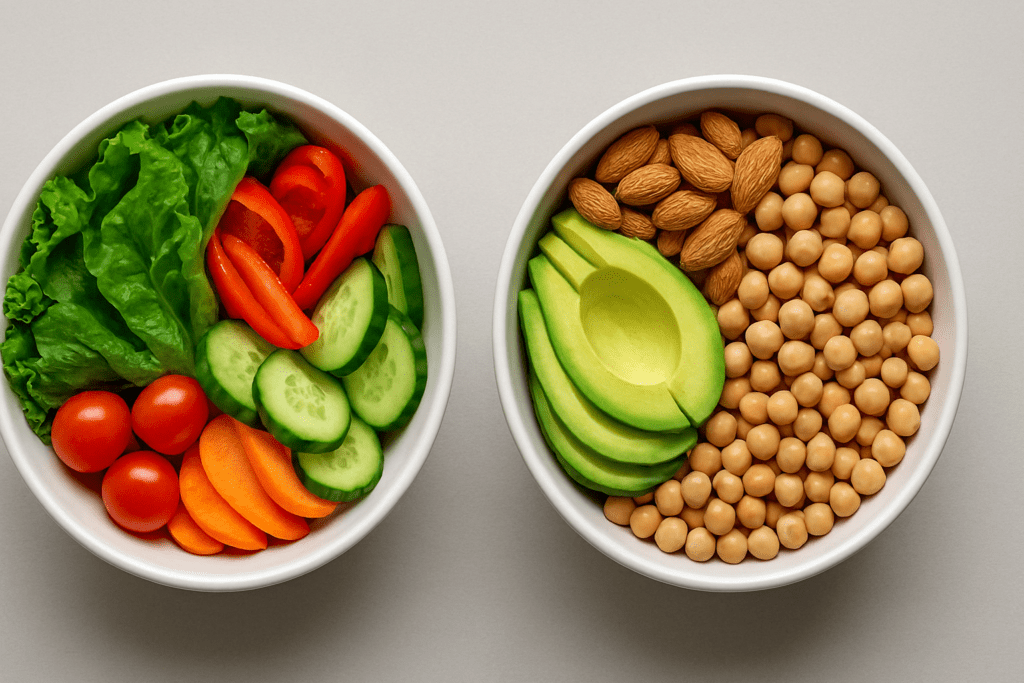
Common Pitfalls to Avoid When Using Calorie Dense Foods
While high calorie foods can be powerful tools for healthful weight gain or metabolic support, misusing them can lead to unintended outcomes. One of the most common mistakes is consuming excess calories from highly processed plant-based items, such as vegan desserts, packaged snacks, or refined oils, which may contribute calories without offering meaningful nutritional value. These products can easily tip the balance toward overconsumption, inflammation, and blood sugar dysregulation if not chosen carefully.
Another challenge involves misunderstanding food density and its role in satiety. Some calorie-dense foods may not trigger the same fullness signals as fiber-rich, water-dense options, leading to unintentional overeating. While the goal may be to increase caloric intake, it’s still essential to remain mindful of hunger and satiety cues. Choosing whole plant-based options that include fiber and protein—like nuts, seeds, and legumes—can mitigate this issue by providing both energy and satisfaction.
It’s also important to avoid over-prioritizing certain food groups at the expense of others. For example, relying too heavily on nuts and seeds without including sufficient vegetables, fruits, or whole grains may limit the intake of other crucial nutrients, such as vitamin C, polyphenols, and complex carbohydrates. A balanced approach ensures that meals remain nutritionally comprehensive even as caloric density increases.
Finally, some individuals may misinterpret the use of calorie-dense foods as a license to abandon intuitive eating practices. Mindful consumption remains vital, regardless of caloric goals. Paying attention to how different foods affect energy levels, digestion, and mood can inform adjustments that support both short-term objectives and long-term well-being. High calorie plant-based eating works best when it remains attuned to the body’s signals and needs.
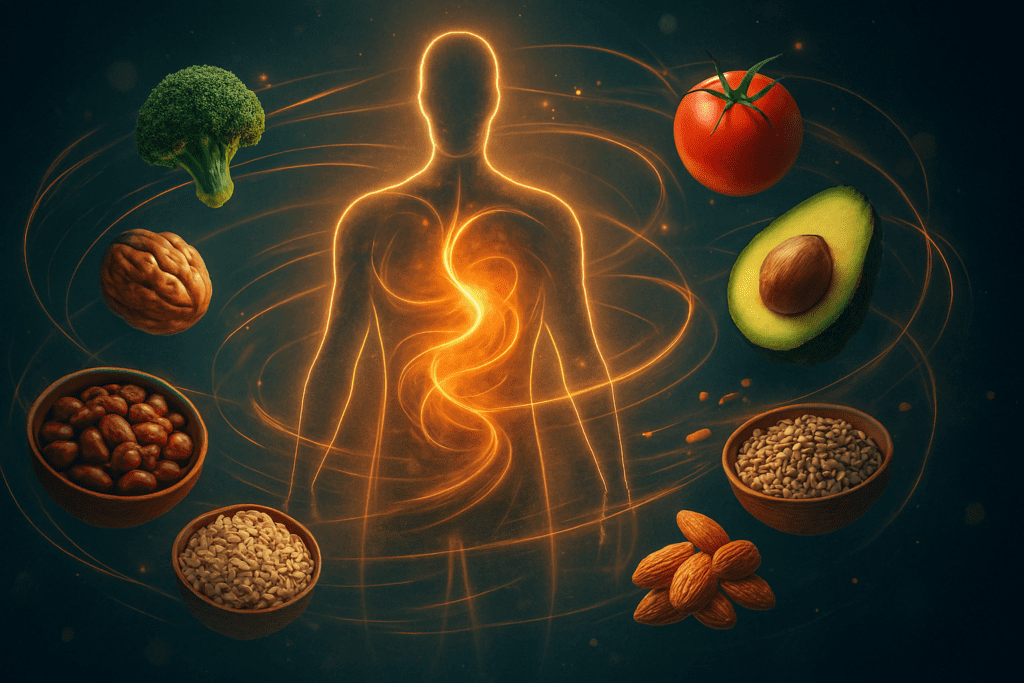
The Psychological and Lifestyle Benefits of Plant-Based Weight Gain
Beyond physical health, gaining weight healthfully through plant-based choices can profoundly influence mental and emotional well-being. Many people seeking to gain weight have struggled with restrictive eating patterns, disordered eating histories, or chronic undernourishment. Transitioning to a whole-food plant-based lifestyle offers a nourishing alternative that emphasizes abundance, compassion, and healing rather than deprivation or control.
Food becomes a source of pleasure and empowerment when meals are built from colorful, diverse, and nutrient-rich ingredients. The act of preparing and enjoying high calorie plant-based foods can foster a more positive relationship with eating, encouraging gratitude and mindfulness. As energy levels stabilize and the body becomes better nourished, many people report improved mood, cognitive function, and sleep quality.
From a lifestyle perspective, embracing food density as a tool for health enables greater freedom and flexibility. Rather than obsessing over portion sizes or calorie counts, individuals can focus on food quality, functionality, and enjoyment. Shared meals with friends and family, travel, and social events become more accessible when nutritional strategies are rooted in abundance and adaptability.
This psychological shift can also support broader health goals by reducing stress-related cortisol spikes and promoting parasympathetic nervous system activation. When eating becomes a pleasurable and intuitive experience, it is easier to maintain consistency, avoid binges or crashes, and cultivate sustainable habits. By integrating high calorie foods for weight loss or gain with a mindful, plant-based mindset, individuals can experience transformation that reaches far beyond the physical.
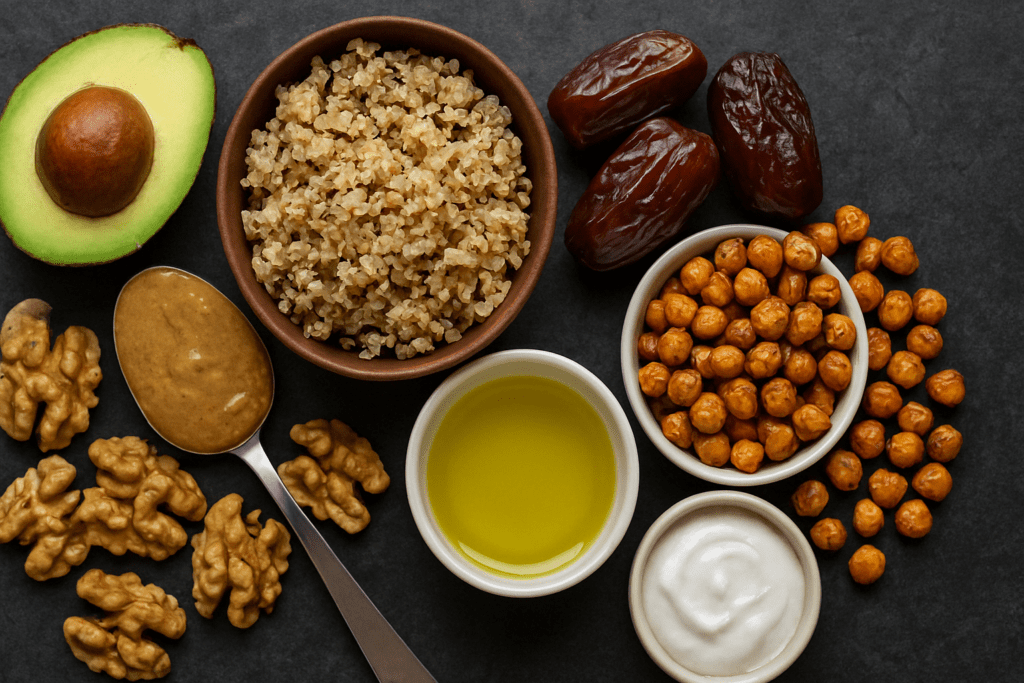
Frequently Asked Questions: High Calorie Foods for Weight Loss with a Plant-Based Approach
1. Can high calorie plant-based foods support muscle gain without resorting to animal products?
Absolutely. Plant-based diets offer numerous high calorie foods for weight loss or muscle gain when paired with resistance training. Foods like lentils, quinoa, tempeh, and nut butters contain both calories and the protein necessary for muscle repair and growth. When selecting the best calorie dense foods for muscle support, it’s important to focus on those that offer complete amino acid profiles or combine multiple sources, such as legumes with grains. The food density of these options enables individuals to fuel performance and recovery while maintaining a plant-based commitment.
2. Are there any overlooked plant-based foods with high food density that are ideal for gaining weight healthfully?
Yes, several lesser-known options can add significant caloric value and nutritional diversity. For example, breadfruit, a starchy fruit popular in tropical climates, is calorie-dense and loaded with complex carbohydrates. Additionally, coconut cream offers both healthy saturated fats and substantial calories food per serving, making it ideal for smoothies and sauces. Black sesame seeds are another underutilized gem with notable food density and micronutrients like calcium and zinc. Exploring global cuisines often reveals what has more calories without relying on processed alternatives.
3. How can someone increase their food intake without feeling overly full or bloated?
The key is to prioritize food density over volume. Choosing high calorie foods for weight loss or gain that are energy-dense but not overly fibrous allows you to consume more calories in smaller portions. For example, blending smoothies with avocado, dates, and tahini can offer concentrated nutrition without excessive bulk. It’s also helpful to space meals strategically and incorporate liquid calories such as plant-based protein shakes. This approach ensures caloric sufficiency without gastrointestinal discomfort or satiety fatigue.
4. Is it possible to tailor high calorie plant-based meals to specific metabolic conditions like hyperthyroidism or insulin resistance?
Absolutely. For individuals with hyperthyroidism, increasing intake of food density can help offset the heightened metabolic rate and prevent unintentional weight loss. Meanwhile, those with insulin resistance must focus on high calorie foods that don’t cause rapid glucose spikes. In these cases, pairing fats with fiber-rich carbohydrates—like nut butter on whole grain bread or chia pudding with berries—can help regulate blood sugar while still delivering sufficient calories food. Tailoring the macronutrient composition ensures metabolic alignment with personal health needs.
5. What are some advanced strategies for athletes using plant-based diets to bulk up efficiently?
Athletes benefit from layering food strategically across meals, especially during pre- and post-workout windows. One effective method is to use nutrient timing—consuming food with high calories food density right after workouts to maximize glycogen replenishment and muscle protein synthesis. High calorie foods for weight loss goals can also serve performance when adapted for bulking; for instance, using granola mixed with nut butter and dried fruit as a portable recovery snack. Precision in meal structure enhances results without requiring animal-based protein sources.
6. Can calorie-dense plant-based eating support hormonal balance, particularly for women?
Yes, hormonal health is intricately linked to adequate caloric and fat intake—both of which can be optimized through calorie-dense plant foods. Avocados, flaxseeds, walnuts, and coconut all provide essential fatty acids and fat-soluble vitamins that play a role in hormone synthesis and regulation. Many women experience disrupted cycles or thyroid dysregulation when under-eating, so increasing food density supports reproductive health. Choosing what has more calories without turning to empty calories ensures both energy availability and micronutrient sufficiency.
7. How do social or psychological factors impact the use of high calorie foods for weight loss or gain in plant-based diets?
Psychological associations with calorie intake often stem from diet culture, which promotes restriction over nourishment. Reframing food as fuel—particularly when selecting the best calorie dense foods—helps restore a positive relationship with eating. Social environments can also influence choices; communal meals that include energy-dense dishes like hummus with olive oil, nut-laden desserts, or hearty grain bowls foster both nutritional and emotional satisfaction. A shift in mindset is necessary to see calorie-dense meals as a form of self-care rather than indulgence. Focusing on quality over quantity can reinforce this transformation.
8. What innovations are emerging in plant-based food products to address high calorie needs?
There’s a growing movement in the food industry to create plant-based products that balance caloric density with clean ingredients. For instance, brands are now offering protein-enhanced nut butters, avocado-based spreads, and seed-enriched granolas that deliver more calories food with minimal processing. Additionally, fortified plant-based milks now include added omega-3s and vitamin D, increasing their nutritional impact. The evolution of food density science in these products allows for customized calorie intake without compromising health goals or ethical values. As this niche expands, consumers can expect even more tailored solutions for caloric enhancement.
9. Are there plant-based foods with high calories food content that also support cognitive performance?
Indeed, some of the best calorie dense foods for brain health include walnuts, hemp seeds, and dark chocolate. These foods combine caloric load with neuroprotective compounds like polyphenols and omega-3 fatty acids. Coconut oil, in moderation, can also serve as a brain-boosting fat source due to its medium-chain triglycerides (MCTs), which some studies suggest may support cognitive energy metabolism. Pairing high calorie foods for weight loss or maintenance with mentally demanding periods—such as exams or work sprints—can enhance clarity and stamina. Food density, in this context, translates directly into mental resilience.
10. How can someone assess whether they’re choosing the best calorie dense foods for their individual goals?
It begins with identifying what has more calories per gram while still aligning with one’s nutritional goals. Whole-food options should always be prioritized over refined, calorie-dense products. Evaluating energy needs, activity levels, digestive tolerance, and food preferences helps determine the optimal mix. Tracking meals briefly using a nutrition app can help illuminate patterns of under- or over-consumption. Ultimately, combining awareness of food density with ongoing feedback from the body—such as energy levels, mood, and recovery speed—offers a holistic gauge for food effectiveness.
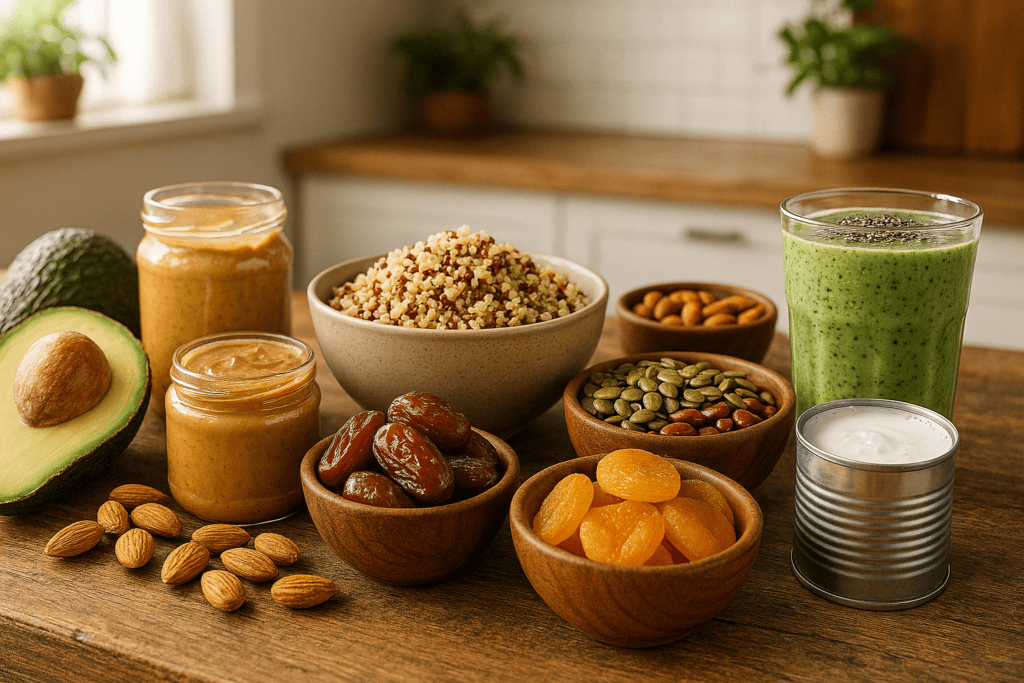
Conclusion: Using High Calorie Plant-Based Foods to Gain Weight Healthfully and Sustainably
Navigating the complex terrain of nutrition, metabolism, and weight management requires both knowledge and intention. For individuals seeking to gain weight, support muscle growth, or enhance metabolic function, embracing the power of calorie-dense, whole-food plant-based nutrition offers a scientifically sound and deeply nourishing path forward. By choosing what has more calories with a focus on nutritional value, individuals can meet their energy needs without compromising health or ethics.
The best calorie dense foods in the plant-based world offer far more than just calories—they deliver essential fats, proteins, antioxidants, and minerals that support long-term vitality. Understanding food density enables more effective meal planning, ensuring that each bite supports energy balance and cellular nourishment. Whether one’s goal is to recover from chronic stress, build strength, or simply enjoy food more fully, incorporating high calorie foods for weight loss and wellness can be a transformative strategy.
Ultimately, this approach underscores the idea that healthy eating is not about restriction, but about alignment—aligning one’s food choices with both physiological needs and personal values. As more people discover the benefits of whole-food, plant-based nutrition, the role of food density in achieving optimal health is becoming clearer. With thoughtful planning, mindful consumption, and a commitment to quality over quantity, individuals can use calories food wisely to support vibrant, empowered living.
Was this article helpful? Don’t let it stop with you. Share it right now with someone who needs to see it—whether it’s a friend, a colleague, or your whole network. And if staying ahead on this topic matters to you, subscribe to this publication for the most up-to-date information. You’ll get the latest insights delivered straight to you—no searching, no missing out.
Further Reading:
11 High-Calorie Vegan Foods for Healthy Weight Gain
What is a plant-based diet and why should you try it?
How to Lose Weight on a Vegetarian Diet
Disclaimer
The information contained in this article is provided for general informational purposes only and is not intended to serve as medical, legal, or professional advice. While NewsHealthWatch strives to present accurate, up-to-date, and reliable content, no warranty or guarantee, expressed or implied, is made regarding the completeness, accuracy, or adequacy of the information provided. Readers are strongly advised to seek the guidance of a qualified healthcare provider or other relevant professionals before acting on any information contained in this article. NewsHealthWatch, its authors, editors, and contributors expressly disclaim any liability for any damages, losses, or consequences arising directly or indirectly from the use, interpretation, or reliance on any information presented herein. The views and opinions expressed in this article are those of the author(s) and do not necessarily reflect the official policies or positions of NewsHealthWatch.

